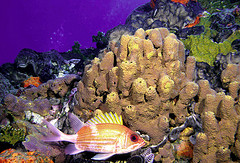European Marine Strategy Framework Directive

The European Union's (2008/56/EC) Marine Strategy Framework Directive (MSFD) was adopted on 17 June 2008, and came into force on 15 July 2008. It was due to be transposed into national legislation by 15 July 2010 and is the environmental pillar of the European Union’s Integrated Maritime Policy.
Contents
Aims and objectives
The Marine Directive aims to protect more effectively the marine environment across Europe by achieving and maintaining Good Environmental Status (GES) of the EU marine waters by 2020 and by protecting the resource base upon which marine-related economic and social activities depend. To achieve these objectives the Directive establishes European marine regions (the Baltic Sea, the North East Atlantic, the Mediterranean and the Black Sea) on the basis of geographical and environmental criteria.
MSFD and Good Environmental Status (GES)
The Directive defines Good Environmental Status (GES) as: "The environmental status of marine waters where these provide ecologically diverse and dynamic oceans and seas which are clean, healthy and productive". To help Member States interpret what GES means in practice, the Directive sets eleven qualitative descriptors which describe what the environment will look like when GES has been achieved:
- Biodiversity is maintained
- Non-indigenous species do not adversely alter the ecosystem
- The population of commercial fish species is healthy
- Elements of food webs ensure long-term abundance and reproduction
- Eutrophication is minimized
- The sea floor integrity ensures functioning of the ecosystem
- Permanent alteration of hydrographical conditions does not adversely affect the ecosystem
- Concentrations of contaminants give no effects
- Contaminants in seafood are below safe levels
- Marine litter does not cause harm
- Introduction of energy (including underwater noise) does not adversely affect the ecosystem
Implementation of GES is problematic for two reasons:[1]
- The threat of a strict legal obligation to GES by 2020 has deterred Member States from accepting mandatory targets for GES. Regarding Member States’ obligations, achieving the GES targets constitutes an obligation of best effort. Infringements of best effort obligations cannot be directly inferred from failure to achieve the targets, but instead require a thorough assessment of the adequacy and sufficiency of measures taken by the Member States.
- The sectors with the greatest impact on GES are maritime transportation, fisheries, and agriculture. These activities are largely governed by international and other EU regimes, which Member States cannot amend in their national implementation.
The Marine Strategy
Introduction
Each Member State is required to develop a Marine Strategy for its marine waters and to use the existing Regional Sea Conventions such as HELCOM, BARCOM and OSPAR when appropriate. The Strategy is in coordination with other countries (EU and non EU Countries within a marine region or subregion). Marine Strategies shall apply an ecosystem-based approach to the management of human activities, ensuring that the collective pressure of such activities is kept within levels compatible with the achievement of good environmental status and that the capacity of marine ecosystems to respond to human-induced changes is not compromised, while enabling the sustainable use of marine goods and services by present and future generations.
Aims of the Marine Strategy
- Protection and preservation of the marine environment and if possible restoration of disturbed marine ecosystems.
- Protecting of the marine biodiversity, marine ecosystems, human health or legitimate uses of the sea by prevention and reduction of inputs in the marine environment.
Timeframe
| Deadline | Task |
|---|---|
| 15 July 2012 | Initial assessment of the current environmental status of national marine waters and the environmental impact and socio-economic analysis of human activities in these waters |
| 15 July 2012 | A definition of what GES means for national marine waters |
| 15 July 2012 | Establishment of clear environmental targets and associated indicators to achieve GES by 2020 |
| 2013 | Report on progress in the establishment of marine protected areas (MPAs) |
| 15 July 2014 | Establishment of a monitoring programme for the ongoing assessment and the regular update of targets |
| 2015 | Development of a programme of (cost-effective) measures designed to achieve or maintain GES by 2020 |
| 2016 | Establishment of a monitoring programme for the ongoing assessment and the regular update of targets |
| 2018-2021 | Review and preparation of the second cycle |
References
- Text of the Marine Strategy Framework Directive [1]
- Criteria and methodological standards on good environmental status of marine waters[2]
External links
The European Commission, the Marine Directive
Please note that others may also have edited the contents of this article.
|
- ↑ Puharinen, S-T. 2023. Achieving good marine environmental status in the EU – Implications of the marine strategy framework directive for member states and blue economic activities. Marine Policy 155, 105712